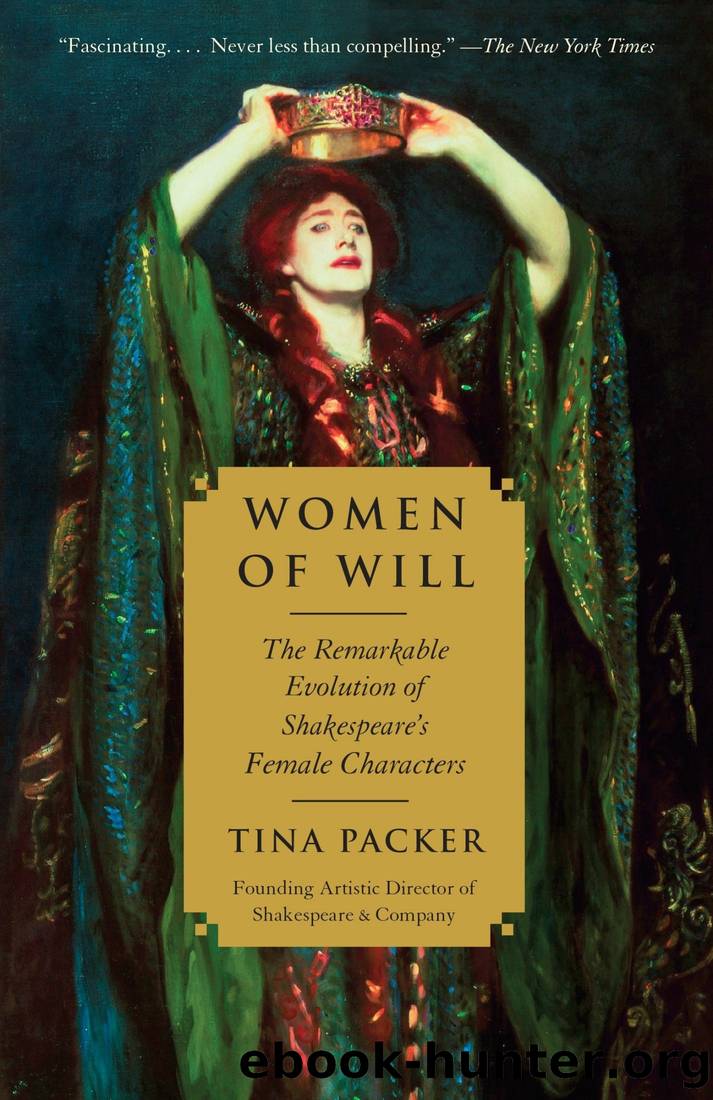Women of Will: The Remarkable Evolution of Shakespeare's Female Characters by Tina Packer

Author:Tina Packer [Packer, Tina]
Language: eng
Format: epub
Tags: literary theory
Amazon: 0307745341
Publisher: Knopf Doubleday Publishing Group
Published: 2016-03-08T00:00:00+00:00
(The fathers who want their daughters dead in Shakespeare’s plays are thick on the ground: Capulet, Egeus, Leonato, Lear, Cymbeline, Leontes, to name a few.)
Through the intervention of Friar Francis and Benedick, Leonato is calmed down and forced to think about Hero’s predicament. She may be telling the truth. They will say that she is dead. She will retire to a nunnery, where she will spend the rest of her days if they do not find the reason for Claudio’s accusations. Everyone leaves the church except Beatrice. She weeps at the altar in shame, rage, and helplessness about being a woman.
Benedick returns. This is the key scene of the play, and really shows Shakespeare’s sensitivity to the predicament of women. As a man of real honor, Benedick will use his superior place in society to rectify this injustice; and if he truly loves, he will love the whole of her, with no caveats.
Benedick approaches the weeping Beatrice—“Lady Beatrice, have you wept all this while?”
“Yea, and I will weep a while longer.”
“I will not desire that.”
“You have no reason. I do it freely.”
“I do love nothing in the world so well as you: is not that strange?”
So, at the time of Beatrice’s greatest vulnerability, Benedick declares his love for her. And, as Nigel likes to point out, he goes first. He says he loves her before he knows for sure how she feels about him.
It leads her to declare her love for him—and at that moment of mutual love, he says, “Come, bid me do anything for thee.”
“Kill Claudio” is the answer.
“Ha, not for the wide world.”
So, at the very joining of the love between them, Benedick pulls back. Even though he thinks Claudio is mistaken, he will not violate the officer honor by fighting his best friend.
Beatrice’s reply is “You kill me to deny it.” And she tries to leave. Benedick stops her. So angry is she at Claudio, she screams that she “would eat his heart in the market-place.”
Then they have an exchange about the true nature of honor—and this is key. In the world they live in, Hero has no way of redeeming her name or proving she’s telling the truth. She cannot challenge Claudio, nor can Beatrice. What Claudio publicly proclaims about Hero will stand, unless a man takes on the voice of the women.
Benedick asks Beatrice, “Think you in your soul the Count Claudio hath wronged Hero?”
Beatrice’s reply is “Yea, as sure as I have a thought or a soul.”
And Benedick says, “Enough, I am engaged.”
The reason this text is so important is, first, he knows that Beatrice has a soul (a truth still not universally accepted, as we discussed before) and, second, he takes Beatrice’s thought as the thought that should guide him. He violates the honor between officers, choosing instead to follow his love. Love is the higher calling.
Of course, because it is a comedy, it all gets sorted out in the end, and no one has to die. When Hero’s innocence is revealed, Claudio must go through public penance and a cleansing ritual.
Download
This site does not store any files on its server. We only index and link to content provided by other sites. Please contact the content providers to delete copyright contents if any and email us, we'll remove relevant links or contents immediately.
Aircraft Design of WWII: A Sketchbook by Lockheed Aircraft Corporation(31772)
The Great Music City by Andrea Baker(21313)
Call Me by Your Name by André Aciman(18964)
The Art of Boudoir Photography: How to Create Stunning Photographs of Women by Christa Meola(17841)
Shoot Sexy by Ryan Armbrust(17142)
Plagued by Fire by Paul Hendrickson(16637)
The Secret History by Donna Tartt(16623)
Portrait Mastery in Black & White: Learn the Signature Style of a Legendary Photographer by Tim Kelly(16484)
Adobe Camera Raw For Digital Photographers Only by Rob Sheppard(16387)
Photographically Speaking: A Deeper Look at Creating Stronger Images (Eva Spring's Library) by David duChemin(16161)
Bombshells: Glamour Girls of a Lifetime by Sullivan Steve(13108)
Pimp by Iceberg Slim(12931)
Ready Player One by Cline Ernest(12838)
The Goal (Off-Campus #4) by Elle Kennedy(12433)
Art Nude Photography Explained: How to Photograph and Understand Great Art Nude Images by Simon Walden(12348)
Kathy Andrews Collection by Kathy Andrews(10520)
Thirteen Reasons Why by Jay Asher(7788)
Wonder by R.J. Palacio(7732)
Goodbye, Things by Fumio Sasaki(7728)
